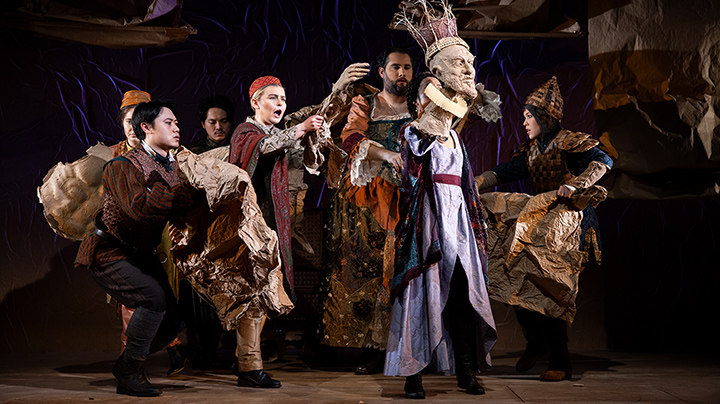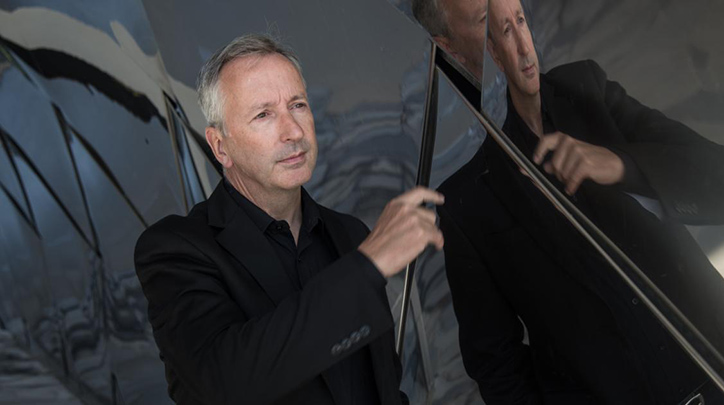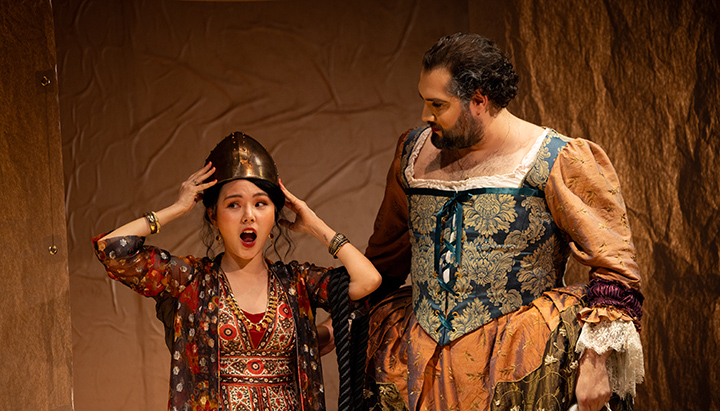
If Juilliard Opera’s Francesco Cavalli production proved a partially inedible main course, visitors Les Arts Florissants and the Boston Early Music Festival served up less ambitious but mostly delicious treats.
Performances by Les Arts Florissants always attract enthusiastic audiences and its first visit to the Morgan Library on February 13th sold out far in advance. Unlike the many large-scale operas it gave at the Brooklyn Academy of Music beginning in the late 1980s, LAF at the Morgan offered an intimate evening of sacred music by Claudio Monteverdi and Giacomo Carissimi featuring just six singers and three instrumentalists under the direction of tenor Paul Agnew, who also performed.
Monteverdi’s haunting Confitebor for five voices opened the program, followed by Carissimi’s Exulta, Gaude, Filia Sionin which Natasha Schnur and Clémence Vidal intertwined their soprano voices to heavenly effect. Hearty bass Edward Grint offered a solo Laudate Dominum by Monteverdi, while Agnew took on the elder master’s Salve Regina. As the group’s co-director, he doesn’t sing as often as he used to, but he demonstrated that he still has the goods. Though sometimes he could be difficult to hear when five or six were singing, he performed the Salve Regina with an intensely extroverted flair that stood out among the low-key numbers in the concert’s first half.
After a brief interval, the group returned without scores and pushed aside their music stands to enact an inspired rendition of Carissimi’s masterpiece Historia di Jepthe. In this sacred oratorio, in Latin and less than a half an hour, we witness the story of Jephthah who, on the eve of decisive battle promises God that in exchange for a victory he will sacrifice the first person he meets. This story may sound similar to Mozart’s Idomeneo, and it was also serves as the subject of Handel’s next-to-last oratorio–with a running time of nearly three hours.
Carissimi’s breathless concision propels the work’s startling impact. Jepthe and his unnamed daughter are its only characters, each vividly characterized amid interjections from the small chorus. Agnew brought out all the father’s anguish while Lauren Lodge Campbell’s resigned Filia greeted her fate with divine resignation. The overwhelming final choral lament must be one of most powerful of its time. The group repeated it for its sole encore and delivered it to an even more devastating effect.
If the modern rediscovery by the Vocal and Chamber Ensembles of the Boston Early Music Festival of secular cantatas by Marazzoli weren’t nearly as edifying, the composer, rather than the performers at the Morgan Library on March 3rd, must take the blame. Billed as “A Garden of Earthly Delights: The Extravagant Musical Entertainments of Marco Marazzoli,” the five pleasant mini-operas alternated solos with choral interjections featuring seven singers accompanied by seven instrumentalists, led as always by Paul O’Dette and Stephen Stubbs.
Among the vocal standouts was Carlotta Colombo who just returned from a major European tour by Il Pomo d’Oro during she performed Carissimi’s Filia, along with the Second Woman in Purcell’s Dido and Aeneas. Her bright soprano could get a bit edgy as it rose, but she eloquently embraced the plight of Radamisto’s wife in La Zenobia, the most affecting piece of the afternoon in which the king’s wife begs her husband to stab her so that she will be spared a more shameful murder by their approaching enemies. James Reese as Radamisto acquiesced with horror as Aaron Sheehan, Jesse Blumberg, and John Taylor Ward spit out venom as the invading Armenians. Teresa Wakim adeptly narrated the sad tale with increasing dread.
Ward’s mellow, wide-ranging bass made an appealing contrast to Blumberg’s more biting baritone in Il Riposo, a tidy allegory about Pope Alexander VII’s desire to escape the tumult of Rome on Lake Albano. Wakim and Colombo then neatly teamed up as War and Peace respectively in La Guerra e la Pace which celebrates the Treaty of the Pyrenees. These occasional works demonstrated that Marazzoli (whom I usually confuse with Domenico Mazzochi) was an accomplished if ultimately unmemorable composer whose lifetime paralleled that of both Carissimi and Francesco Cavalli.
The latter, whose operas are now regularly performed around the world after his rediscovery during the 1960s, might be best known for his deliciously scandalous La Calisto which Juilliard mounted beautifully eight years ago in a production that featured future stars Samantha Hankey and Jakub Jósef Orlinski.
Orlinski then starred in Erismena (this year’s Juilliard Cavalli) at the 2017 Aix-en-Provence Festival, one of his first international engagements after graduation. In late February, the conservatory presented three performances of Erismena in the intimate Willson Theater with six instrumentalists from the school’s Historical Performance program led by Avi Stein at the harpsichord.
Unfortunately Erismena turned out to be as confounding as Calisto had been enchanting. The first puzzling clue arrived in the program which informed the audience that the role of the old king Erimante was being taken by the “Full Cast.” In her program note, director Lisenka Heijboer Castanón informed us that while editing the work for performance, she determined “the cast should all play the king because his character is too big for anyone to play him alone.” Egad! The cast’s nine singers then variously embodied Erimante while manipulating Julian Crouch’s puppet contraption made of a head, two hands and lots of crumbled-up brown wrapping paper. His character’s music, composed for a bass, was sometimes delivered by a single voice—soprano, mezzo, tenor or bass—and sometimes by a collection of several of those. Her “concept” was both musically and dramatically completely off-putting.
Heijboer Castanón’s bizarre communal idea (no doubt in cahoots with Crouch, best known locally for his Met Satyagraha) undermined his cheap-looking brown-paper production which otherwise fluently presented librettist Aurelio Aureli’s insanely complicated story of the disguised-as-a-man Erismena negotiating the serious and comic romantic intrigues of Erimante’s court. Erismena doesn’t strike me as one of Cavalli’s most inspired works: its acres of recitative weren’t sparked with many cheery comic ditties or wrenching laments familiar from other of the composer’s many works.
However, its dense libretto had some small advantage of being performed in English at Juilliard though the translation, revised by Heijboer Castanón, Crouch, Stein and Ligiana Costa, featured such a syntactically complex style that it would have been tough to follow without the projected titles. The cast’s mostly clear diction was helpful nonetheless. I wondered if the translation used was an adaptation of the unusual English version made in the mid-17th century, but the program’s extensive and otherwise helpful notes didn’t say. Georgeanne Banker’s introduction, however, did offer that “Aldimira, Erismena, Orimano and Idraspe unite in a chorus, concluding the opera in a brilliant moment of vocal harmony.”
But, alas, that isn’t how this version of the opera ended: the concluding movement was instead a lightweight comic scene between minor characters Flerida and Argippo. Cutting the allegorical prologue is a common practice, but no Cavalli opera would end in such a manner, yet another of the baffling choices made by the production team.
Placement of the instruments made the harp and theorbo virtually inaudible, but cellist Andrew Koutroubas and keyboardist Yunji Ji collaborated well with Stein in those long, long stretches of recitative which the cast delivered stylishly. Song Hee Lee as the flirtatious Aldimira threatened to outshine the more subdued Tivoli Treloar as the disguised title character, but both excelled in weaving spells. Stephanie Bell’s rich mezzo shone in Idraspe’s music but her dour-drag portrayal made less of her conflicted character’s dilemma that it might have. Guen-hyeong Han’s pallid Orimano let down the central love-quadrangle.
Lusty, aging nurses are a commonplace in Cavalli operas and Juilliard cast the delightful Trevor Haumschilt-Rocha as Alcesta-with-the-hairy-decolletage. Towering over the rest of the cast, he used his ringing, clear baritone unerringly and never camped up his witty music. His strong contributions to the many-voiced Erimante also stood out.
Cavalli operas are still rare enough in the US that one is always grateful to encounter them. I enjoyed La Doriclea, an earlier Juilliard effort in 2008, but Erismena’s sad misfire was not a cause for celebration. I don’t see any more 17thcentury Italian music on the horizon, but Manhattan School of Music is performing Purcell’s irresistible The Fairy Queen in early May.
Photos: Maria Baranova




























Comments